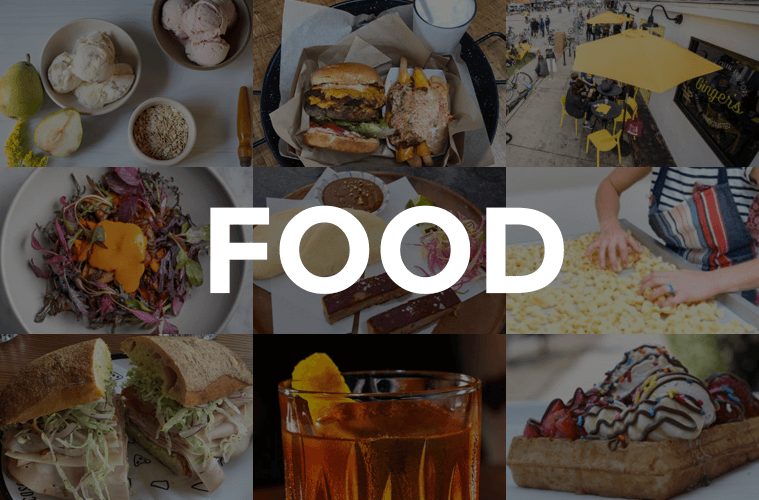“Clifton’s was my Disneyland, an escape from the turmoil at home,” remembers restaurateur Jim Lucero, who loved the waterfall cascading down the restaurant’s three-story façade. In the grottolike interior, caged birds dotted tropical foliage; giant neon calla lilies lit a limeade fountain and a sherbet volcano. Its food lines, which were always very long, snaked through a dark cave that opened onto a brilliantly lit and seemingly endless panorama of dishes. Customers seemed straight out of Andy Hardy: Ladies often wore hats, and Mary Janes with socks were de rigueur for little girls. “My family took the Red Car from our home in Whittier,” remembers artist William Roode, 57.
The menu back in ’35, mostly comfort fare of Midwestern origins, has not changed. In true cafeteria tradition, desserts are displayed first. Each day as many as 100 sweets recall recipes from Fanny Farmer: shortcakes slathered with glistening glaze, baked custard, and lemon meringue pie. And, of course, there’s the ever-popular baroque gelatin desserts gleaned from the sides of Jell-O boxes. A few throwbacks, such as stewed prunes and tapioca pudding, might recall the school cafeteria for some, but overall the bounty serves to whet the appetite for the stands of bone-in roast beef carved before you, and servings of freshly roasted turkey with “all the trimmings.”
In 1931, when Clifford Clinton (merging his two names into Clifton) opened Pacific Seas, he never imagined a chain of six Clifton’s cafeterias would become institutions in L.A. Clifton’s prosperity during the Great Depression came from creating a sense of boundless plenitude for penny-pinching prices. During the early days, signs in Clifton’s dining rooms announced, “Pay what you wish”; Clinton vowed never to turn a hungry customer away (as a missionary’s son, he had witnessed starvation in China and later founded the Meals for Millions Foundation). But Clinton’s idealistic notion nearly did in his business until he opened a more modest “Penny Cafeteria” near Pacific Seas. He always credited generous suppliers and his “family” of patient, supportive employees, many of whom have logged in over 40 years to date, for helping stave off bankruptcy.
With the enormous success of Pacific Seas, four years later Clinton opened Brookdale at Seventh and Broadway, the nation’s largest cafeteria. It was another extravaganza. Waterfalls trickled into brooks, polyfoam canyons sprouted pines, and glassed-in backlit bucolic scenes conjured California’s redwood groves. Brookdale, one of three Clifton’s still run by the founder’s children and grandchildren, looks the same today. Its fancier third floor, with red Victorian flocked wallpaper, hosted many a business meeting and offered complimentary birthday cakes for parties.
In their prime, Brookdale and Pacific Seas served some 15,000 meals daily. Pacific Seas was razed for a parking structure in 1960. And now that the grand downtown department stores have dwindled and first-run movies play suburban multiplexes, Brookdale is surrounded by jewelry stores with signs that offer bargain prices on “oro.” Young families come in for Sunday dinner. Older customers who live in the small hotels nearby linger well past mealtimes to kibitz and reminisce. “Clifton’s is their second home,” says Robert Clinton, the founder’s grandson.
A few regulars are legendary: There’s the artist who does charcoal caricatures, the wizened black tap dancer who’ll entertain at the slightest provocation, and Jimmy, the octogenarian former security guard. “He’s the one with the badge,” offers Clinton.
And now, placed among Brookdale’s standard offerings are ceviche, salsas, and desserts such as flan. Still, most of the food is nothing to challenge the intellect. You’ll be politely served satisfying portions of nostalgia that are still freshly prepared and as tasty as ever. 648 S. Broadway (just east of Seventh Street); (213) 627-1673.
Advertising disclosure: We may receive compensation for some of the links in our stories. Thank you for supporting LA Weekly and our advertisers.

